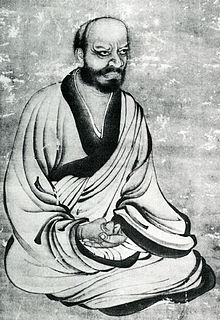User:Mind meal/Sandbox17
Línjì Yìxuán | |
|---|---|
 Japanese painting of Linji Yixuan (Jap. Rinzai Gigen). | |
| Title | Ch'an Master |
| Personal | |
| Born | unknown |
| Died | 867 |
| School | Ch'an |
| Senior posting | |
| Teacher | Huangbo Xiyun |
Línjì Yìxuán (臨済義玄; Wade-Giles: Lin-chi I-hsüan; Japanese: Rinzai Gigen) (d. 866) was a T'ang Dynasty Ch'an master credited with founding the Ch'an school of his namesake (the Línjì school), later imported to Japan by Myōan Eisai in the 12th century. Línjì was an eccentric teacher often characterized by his use of shouting (katsu) and slapping as a means to steer his students to enlightenment. By the Song Dynasty, the Línjì school had become the most significant of the Five Houses of Ch'an.
Biography[edit]
Línjì Yìxuán was born sometime between 810 and 815 in Ts'ao prefecture of China. It is unknown at what date he first became a monastic, though initially he did study the Vinaya and Mahayana Buddhist teachings. He traveled to Chiang-tsi and entered the monastery of Huangbo Xiyun where, for three years, he made very little progress in his Buddhist practice. Having never requested instruction from his teacher, he finally visited his teacher and asked him about the "cardinal principle of the Dharma." He asked Huangbo three times and each time received a striking blow in return. Discouraged, and contemplating leaving the monastery altogether, Huangpo recommended that he visit the master Dayu (大愚). Línjì experienced enlightenment during his first interview with Dayu and returned to Huangbo, who confirmed his enlightenment and made him his Dharma heir.[1]
For the next ten years Línjì continued studying under Huangbo, later leaving for the small temple Lin-chi yuan (from which he derived his name) near the city of Chen-chou. Toward the end of his life he lived at a temple in Wei-fu.[1]
Teaching style[edit]
Línjì adopted the use of shouting and dealing out striking blows to his students, just as Huangbo Xiyun had done with him prior to his enlightenment.[2]
Notes[edit]
References[edit]
- Baroni, Helen J. (2002). The Illustrated Encyclopedia of Zen Buddhism. The Rosen Publishing Group, Inc. p. 139. ISBN 0823922405. OCLC 42680558.
- Fowler, Merv (2007). Chinese Religions: Beliefs and Practices. Brighton; Portland, OR: Sussex Academic Press. ISBN 978-1845191726.
{{cite book}}: Unknown parameter|coauthors=ignored (|author=suggested) (help)
